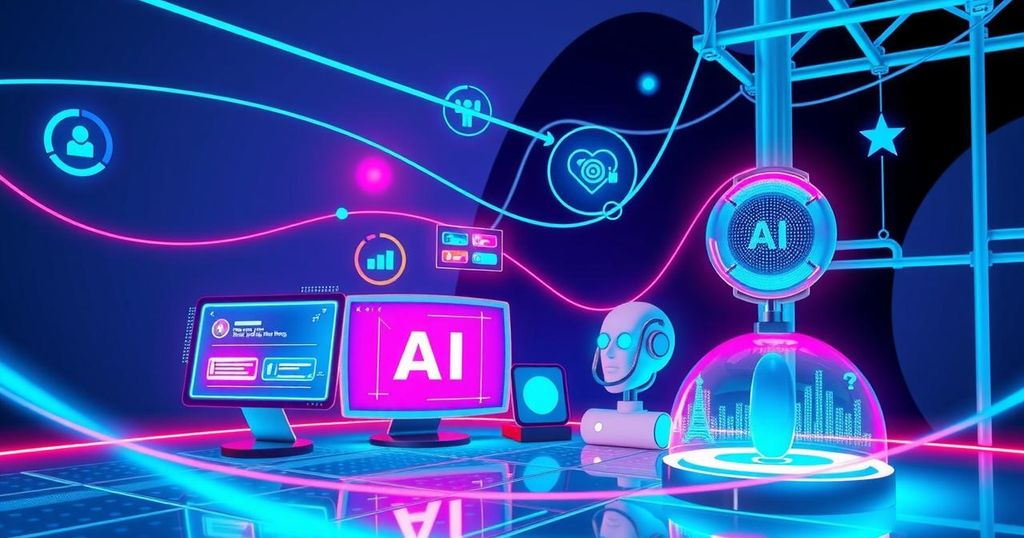Top Artificial Intelligence Stats You Should Know About in 2025
AI is transforming the business landscape rapidly, impacting various industries globally. With expectations of significant market growth and the widespread utilization of AI tools, understanding these trends is critical for future career success. Companies are increasingly adopting AI strategies for growth, while consumers are unknowingly interacting with AI technology daily.
As we stride further into the digital age, the explosive adoption of artificial intelligence (AI) is reshaping how businesses operate. This surge isn’t just a trend; it’s a complete transformation. AI, alongside its sibling, machine learning (ML), is leading the charge in the so-called Industry 4.0. From healthcare to automotive sectors, its influence cuts across the entire spectrum of industries, driving efficiency, reducing costs, and enhancing customer experiences. This technology is not in the distant future; it’s very much our present, now embedding itself into our daily lives.
Statistically speaking, you’d be surprised how pervasive AI has become — nearly 77 percent of today’s devices harness some form of AI. The startup scene’s enthusiasm for AI has skyrocketed, growing 14 times since the year 2000. Moreover, an overwhelming majority of business leaders — 84 percent, to be precise — embrace the potential of AI to fuel their growth ambitions. The global AI market, with all its promise, is predicted to be worth a staggering $190.61 billion by 2025, boasting a compound annual growth rate of 36.62 percent.
It’s no wonder that experts foresee AI adding an incredible $15.7 trillion to the global GDP by 2030. But hold onto your hats; forecasts indicate that by then, AI-powered digital voice assistants will outnumber humans, with an expected 8.4 billion units in existence. Statistics like these signal an undeniable revolution in how we live and work.
Let’s dig deeper into some AI stats for the near future. For starters, 75 percent of top executives believe that an AI strategy is imperative for growth and gaining a competitive edge. Interestingly, a survey highlighted that 41 percent of consumers in several countries, including the United States, are optimistic that AI technologies will enrich their lives.
Here’s a curious tidbit: only 34 percent of people even realize when they’re using AI. A study found that while many are unaware, 84 percent are actually interacting with AI-powered platforms on a daily basis. When it comes to smartphones, a whopping 96 percent of Android users and 98 percent of iPhone users rely on AI-driven digital assistants like ‘Siri’ and ‘OK Google’. And the trend is only increasing; a striking 41 percent of smart device users engage with voice-search features on a daily basis.
Now, according to a Capgemini report, something like 29 percent of AI applications within manufacturing focus on predicting equipment maintenance – that’s right, AI is tailored to keep businesses running smoothly. French food giant Danone has leveraged AI for demand planning, successfully reducing forecast errors and cutting down on waste.
Retailers, not wanting to lag behind, are eyeing AI for optimizing pricing strategies. Recognizing that savvy shoppers are drawn to the best prices, an IBM study revealed retailers’ intentions to adopt AI systems to ensure competitive pricing by 2025. It’s that proactive engagement that could redefine consumer communication through AI chatbots, which Gartner notes will revolutionize customer experience in just a decade, potentially handling 95 percent of customer interactions.
On the automotive front, AI could help boost operating profits by as much as 16 percent in production and supply chains, according to Capgemini. With China leading the pack, AI is projected to contribute 26.1 percent to its GDP by 2030 – North America and the UAE follow closely.
For those eager to plunge into the world of AI and machine learning, Simplilearn offers programs designed to fit various skill levels, including interactive, industry-recognized courses that connect learners to the fast-evolving AI landscape. There’s never been a better time to embrace AI in career development, especially as reports highlight that technology will fundamentally reshape the workforce in the years to come.
AI is no longer just a futuristic concept; it’s reshaping today’s businesses and lives. Statistics reflect an impressive growth in its adoption, from devices to practical applications across various sectors. As we look ahead, understanding these trends is crucial for navigating the changing job landscape and leveraging the opportunities that come with AI. Upskilling in this tech-driven environment is not just wise; it’s essential for career sustainability.
Original Source: www.simplilearn.com




